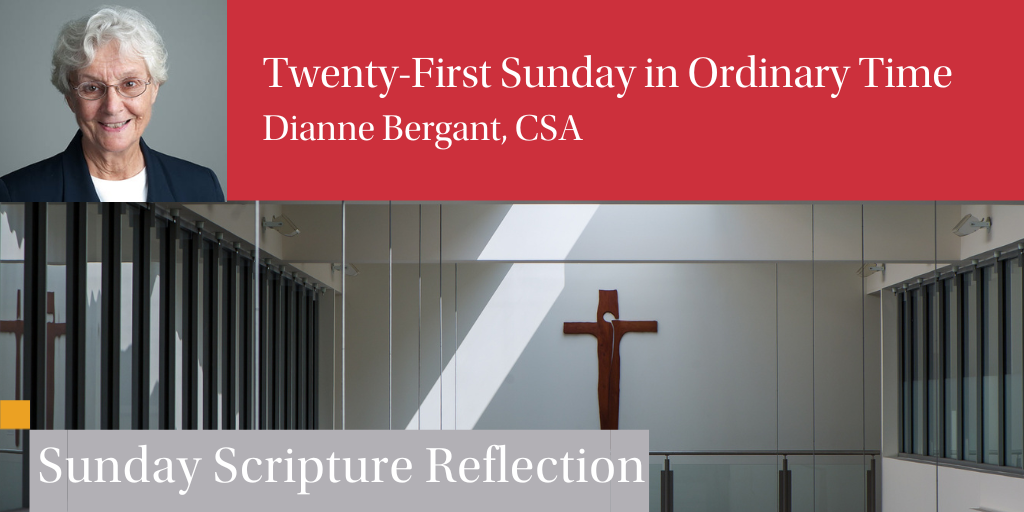
Readings:
Reading I: Isa 66:18-22
Psalm: 117:1-2
Reading II: Heb 12:5-7, 11-13
Gospel: Luke 13:22-30
All Are God’s People
As surprising as it may seem, there is a divine characteristic that many religious people find very troublesome. It is God’s universal concern for all the people of the world. It seems that some people resent the thought that God would be gracious toward people who hold different religious and political views. They prefer to see such people punished for their errors rather than accepted by God and even saved.
This exclusionary point of view can be found in some of the earliest traditions of Israel. There we find the notion of a patron God who chose one people from among many, protected that people from threats posed by other nations, and blessed them with peace and prosperity. Such a God was considered the special patron of Israel, but not the patron of the entire world. The other nations had their own gods to care for them. It was only gradually that ancient Israel’s concept of God developed and expanded so that the universal scope of God’s love and care became clear. The Israelites soon came to see that God is concerned with the happiness and salvation of all. Today’s readings underscore this universal divine concern.
The passage from the Book of Isaiah contains an announcement that in the near future people from several foreign lands will be called together by God. These gathered people will become a sign of the glory of God for still other foreigners. This is a very curious prediction. It is one thing to bring the captive and scattered Israelites back to their land, but those referred to here are not Israelites. These people come from the “nations of every language.” In other words, those who are outsides will become insiders. To this remarkable example of divine universalism is added the shocking declaration that these foreigners will even be numbered among the priests and Levites. Has ancient Israel’s strict code of purity, particularly ritual purity, been overturned? Will the unclean foreigners gain access even to Israel’s most sacred precincts? Has the exclusive circle known as ‘the people of God’ been expanded to include anyone who wishes to join? And if this is the case, who now does not belong to ‘the people of God?’
The gospel reveals a slightly different perspective of the notion of being ‘chosen.’ Its focus is on entrance into the reign of God. Some of the people at the time of Jesus seemed to have presumed that since as Jews they belonged to the ‘chosen people,’ they would automatically have easy access to the long-awaited reign of God. This reign was understood as a promised state of being that would bring to fulfillment all of Israel’s religious hopes and dreams. Jesus quickly disabused the people of their erroneous presumption. He insisted that those who would not make the necessary effort would be denied entrance into the reign of God. And who would occupy the places they thought would be theirs? As was seen in the passage from Isaiah, it will be foreigners “from the east and the west and from the north and the south.” Once again we see that outsiders will become insiders. However, there is an added reversal in the gospel reading. Jesus warns that those who had been considered insiders might find themselves outside the banquet.
Though it consists of only two short verses, the responsorial psalm picks up this same theme of universal inclusion. In it, all nations, all peoples are invited to praise God. The reason given for this praise is the divine kindness and fidelity (two technical covenant words) shown to Israel. This call to foreigners to praise a God not their own may seem strange. However, we must remember that Israel was a rather insignificant nation in the ancient world. If other nations realized that despite this lowly status Israel’s God was able to protect and care for the people, these other nations would recognize the power and goodness of that God. Thus, through the witness of Israel, other nations would be drawn to God and would join Israel in praising God.
One aspect of being an insider is not always appreciated, and that is the need to be disciplined. If we truly want to belong to the reign of God, we must act accordingly. The author of the Letter to the Hebrews calls our attention to this. We must be trained in righteousness, and this is not always pleasant. Many of us need to rid ourselves of selfishness, arrogance, and greed. Others of us need to cleanse our hearts of bias and discrimination whether political, racial, gender identification, religious, etc. The psalm response provides even more challenges. Our baptism conferred on us the responsibility of witnessing to the entire world the glory of God. People of every religious faith, political position, racial identity, or gender classification should be able to recognize God’s goodness in the way we live our lives and the manner in which we interact with them. This is particularly important today, when there is such animosity in every aspect of society. This challenge of openness and acceptance may well be the narrow gate through which we must pass if we hope to sit at the table in God’s kingdom.
Carroll Stuhlmueller, CP, Distinguished Professor Emerita of Old Testament Studies
